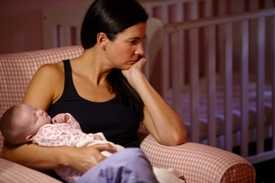Depression Among Women
Depression is common and treatable. If you think you have depression or postpartum depression, seek treatment from your health care provider as soon as possible.
Depression
Everyone feels sad sometimes, but these feelings usually pass within a few days. Depression interferes with daily life and may last for weeks or months at a time. Depression is a common and serious illness. National survey data showed that about one 1 out of 10 women 18-44 years old experienced symptoms of major depression in the past year. Most people, even those with the most severe forms of depression, can get better with treatment.

Symptoms of Depression
Depression doesn’t feel the same for everyone. How often symptoms occur, how long they last, and how intense they may feel can be different for each person.
Symptoms of depression include
- Lasting sad, anxious, or “empty” mood.
- Feelings of hopelessness or pessimism.
- Feelings of guilt, worthlessness, or helplessness.
- Feelings of irritability or restlessness.
- Loss of interest in hobbies and activities.
- Loss of energy.
- Problems concentrating, recalling details, and making decisions.
- Difficulty falling asleep or sleeping too much.
- Overeating or loss of appetite.
- Thoughts of suicide or suicide attempts.
- Aches or pains that do not get better with treatment.
Postpartum Depression
Postpartum depression is depression that occurs after having a baby. Feelings of postpartum depression are more intense and last longer than those of “baby blues,” a term used to describe the worry, sadness, and tiredness many women experience after having a baby. “Baby blues” symptoms typically resolve on their own within a few days. CDC research shows about 1 in 9 women experiences postpartum depression. View your state’s prevalence of postpartum depression using PRAMStat, an online data platform from the Pregnancy Risk Assessment Monitoring System.
Symptoms of Postpartum Depression
The symptoms of postpartum depression are similar to symptoms for depression, but may also include
- Crying more often than usual.
- Feelings of anger.
- Withdrawing from loved ones.
- Feeling numb or disconnected from your baby.
- Worrying that you will hurt the baby.
- Feeling guilty about not being a good mom or doubting your ability to care for the baby.
Risk Factors for Depression
Experiences that may put some women at a higher risk for depression include
- Stress.
- Low social support.
- Difficulty getting pregnant.
- Being a mom to multiples, like twins, or triplets.
- Losing a baby.
- Being a teen mom.
- Preterm (before 37 weeks) labor and delivery.
- Having a baby with a birth defect or disability.
- Pregnancy and birth complications.
- Having a baby or infant who has been hospitalized.
Depression can also occur among women with a healthy pregnancy and birth.
Treatment
Depression is treatable and most people get better with treatment. If you think you may be depressed, the first step to seeking treatment is to talk to your health care provider. You can ask your health care provider for a referral to a mental health professional or visit CDC’s Resources to find help in your area. See CDC's depression treatment to learn about seeking treatment for depression.
How Depression Affects Fathers
According to a 2010 study using data from 1993 to 2007, approximately 4% of fathers experience depression in the first year after their child’s birth. By a child’s 12th birthday, about 1 out of 5 fathers will have experienced one or more episodes of depression. Younger fathers, those with a history of depression, and those experiencing difficulties affording items such as a home or car were most likely to experience depression.
- Page last reviewed: February 15, 2017
- Page last updated: February 15, 2017
- Content source:


 ShareCompartir
ShareCompartir